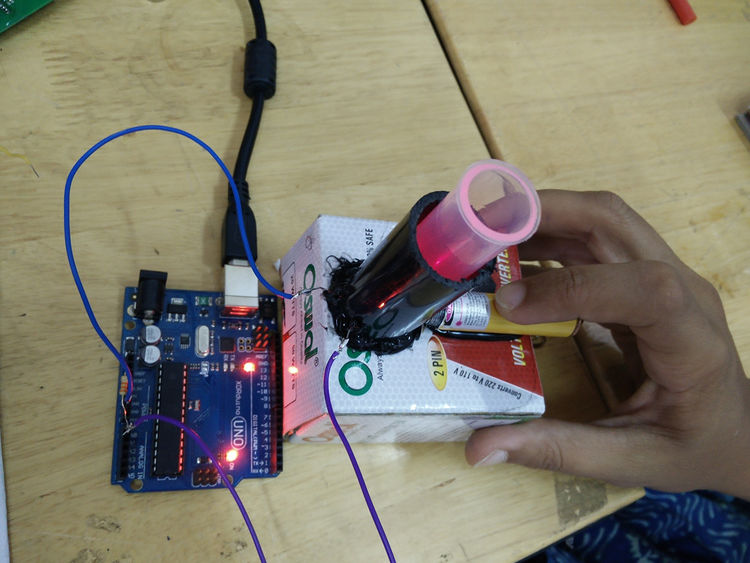Difference between revisions of "Turbidity meter"
From (art)scienceblr
(Created page with "Making turbidity meter with Tasneem .") |
|||
| (3 intermediate revisions by 2 users not shown) | |||
| Line 1: | Line 1: | ||
| − | + | '''This is a simple Turbidity meter with a Light Dependent Resistor and a Laser''' | |
| + | |||
| + | [[File:Turbidity 1.jpg|750px]] | ||
| + | |||
| + | '''Materials needed''' - | ||
| + | |||
| + | 1. LDR | ||
| + | |||
| + | 2. Laser Pointer | ||
| + | |||
| + | 3. 33k Resistor | ||
| + | |||
| + | 3. Dark tube/Box (We used a black pvc pipe) | ||
| + | |||
| + | 4. Arduino + usb cable | ||
| + | |||
| + | 5. Wires | ||
| + | |||
| + | 6. test tubes | ||
| + | |||
| + | Tools - | ||
| + | |||
| + | 1. Soldering Iron + Solder | ||
| + | |||
| + | 2. Glue Gun | ||
| + | |||
| + | 3. wire cutter/stripper | ||
| + | |||
| + | |||
| + | 1. Connect one leg of the LDR ground on the arduino . The other leg of the LDR will go to analog input 0 (Any of the analog inputs can be used. | ||
| + | |||
| + | 2. Connect one leg of the resistor to +5V on the arduino. The other leg of the resistor will go to the same analog input as the LDR (A0 in this case). This forms a [https://en.wikipedia.org/wiki/Voltage_divider| potential divider.] | ||
Latest revision as of 12:09, 4 April 2016
This is a simple Turbidity meter with a Light Dependent Resistor and a Laser
Materials needed -
1. LDR
2. Laser Pointer
3. 33k Resistor
3. Dark tube/Box (We used a black pvc pipe)
4. Arduino + usb cable
5. Wires
6. test tubes
Tools -
1. Soldering Iron + Solder
2. Glue Gun
3. wire cutter/stripper
1. Connect one leg of the LDR ground on the arduino . The other leg of the LDR will go to analog input 0 (Any of the analog inputs can be used.
2. Connect one leg of the resistor to +5V on the arduino. The other leg of the resistor will go to the same analog input as the LDR (A0 in this case). This forms a potential divider.
